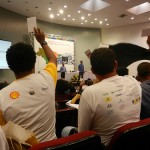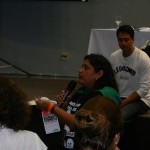by deia
December 08, 2011
Magdalena Donoso, Latin American Coordinator for GAIA
BRASÍLIA – From the point of view of our interest as organizations that fight against incineration, just talking about the National Solid Waste Law in Brazil – ratified in August 2010 – pushes us to address the negative and exhausting Article 9 of the Law, which opened the door to that industry.
However, I would like to share my experience after participating as an “observer” in the “Public Audience of the National Solid Waste Plan (PNRS),” held in Brasilia on November 30 and December 1. This hearing is part of a public consultation process which was launched in September 2011. The aim was to receive and then incorporate citizen’s contributions to the PNRS. Also, contributions are being received over the Internet until late December.
The results of these regional hearings and the contributions sent through the internet were put together and presented at the hearing in Brasilia for the audience there to add more contributions and then vote on them. In a big hall, 600 people from all sectors sat down to collectively discuss the guidelines, strategies and goals for the management of waste in the country. Two full days of work, discussed, fought at times, allowed me to witness an exciting time of democratic expression. Brazilian citizens from all sectors — industry, trade associations, NGOs, and a contingent of 100 wastepickers from different states with green and blue “MNCR” flags tied to their necks contributed with their knowledge, views and interests in building a “social pact for Brazil” on waste matters. In a grueling two-day journey, point by point, the assembly voted each contribution, and the citizen’s demands prevailed. Representatives of organizations — many of them members of the anti-incineration coalition of Brazil and leaders from across the country (also members of the coalition), left the room with a big smile on their faces.
As stated in the Government’s official website, “the Plan establishes a series of measures that should lead to the end of open landfills, the application of the so called “coleta selectiva,” the incorporation of wastepickers, and the promotion of responsible consumption.” The final text will be a presidential decree that will establish a new comprehensive analysis of the situation of solid waste in Brazil. It will outline the aims and set deadlines for the implementation of the plan.
This time citizens are being heard. Why didn’t the government listen when they approved the fateful article that opened the door to incineration? Some leaders believe it was because there still was scarce articulation and empowerment to counteract forces. This time, I could witness how far the authorities listen to wastepickers. In each of the speeches at the Brasilia event – every one without exception- they were mentioned as key players in the process. At the opening of the Assembly, Samira Crespo, Secretary of National Articulation and Environmental Citizenship, released a study that found that 60 percent of waste recycled in the country are due to the direct work of the wastepickers. This is also expressed in the PNRS: in almost all the strategies defined in it, the role of wastepickers is mentioned. Now, we all hope, and we must ensure that it happens, that the public expression embodied in the plan will not be betrayed when implementing public policies.
What is happening today with the PNRS compared with what happened with the Act reinforces our belief in how crucial it is to “build movement,” and as GAIA we have supported this process with respect and conviction. We appreciate the confidence of our members and our allies.
Many of us would have loved Brazil to become the first Latin American country that eliminates the alternative of incineration as an option. But although this did not happen, the country has 57 other items that emphasize reduction, reuse and recycling. In addition, thanks to the results of this hearing, the Work Plan that provides the tools for the law to become reality at least will “complicate” the possibilities of the incineration industry. That is unquestionably a citizen’s triumph. As for the audience with whom I shared those two days, the subject of the majority was how to optimize systems to reduce, reuse and recycle, and how we move forward in incorporating – in a professional way — wastepickers in the process.
It was a privilege and an inspiration to be an “observer” of this space for discussion, and what happened there was a triumph of forces: organizations and wastepickers united in a common cause. We know there is a long way to go and that many threats are to be faced, but Latin America is grateful for this example, compañeros.
Tweet




